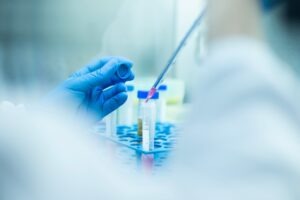Labcyte announced that GSK has joined its consortium with AstraZeneca to combine acoustic liquid dispensing technology from Labcyte with Mass Spectrometry (MS) for use in high throughput small molecule screening and other drug discovery applications.
Subscribe to our email newsletter
Acoustic liquid dispensing, pioneered by Labcyte, uses the gentle energy of sound waves to move minute quantities of liquid with precision and accuracy. It has been enhanced to generate an MS-friendly mist of nano-droplets in a process called Acoustic Mist Ionization (AMI).
Mass spectrometers are currently used to quantify the amount of drug substance present in screening assays, drug metabolism studies, and safety and efficacy experiments. The use of MS through AMI in high throughput applications has the potential to reduce both cost and cycle time in early drug discovery.
“Labcyte’s standard acoustic liquid handling has already been deployed across many areas of life science research and drug development as the result of its many benefits,” said Mark Fischer-Colbrie, Chief Executive Officer at Labcyte.
“Our goal is to continue that expansion with Acoustic-MS. We have made significant progress in collaboration with AstraZeneca over the past four years with great results. This new consortium will help validate new applications and optimize the Acoustic-MS technology for both creating new workflows as well as for fitting into existing drug discovery processes.”
With the addition of GSK, the companies have formed a consortium to advance the development of Acoustic-MS for high-throughput chemistry analysis, and biochemical and cell-based assays supporting a range of drug targets.
Both pharmaceutical companies will work with multiple prototype instruments – applying the technology to high-priority assays – and will share their findings with other members of the consortium. Labcyte plans to launch a commercial Acoustic-MS system designed to support a broad range of assays.
AstraZeneca has demonstrated the technology’s significant capabilities to conduct biochemical screening applications at rates up to three samples per second. For example, AZ recently completed a full library screen of 2.7 million compounds in less than six weeks using this approach.
AstraZeneca’s Jonathan Wingfield, Principal Scientist, Discovery Sciences, Innovative Medicines AZ, is excited about these great advancements. “We have proven that Acoustic-MS technology works, and generates vastly reduced assay development times, improved cost savings and fewer false positives. The addition of GSK provides the opportunity to expand the development of this technology and reinforces AstraZeneca’s commitment to open innovation.”
Melanie Leveridge, Director, Screening, Profiling and Mechanistic Biology at GSK, commented: “We value innovation and collaborative development, and are excited to be working with Labcyte and AstraZeneca to further develop Acoustic-MS for high throughput screening applications, as well as exploring new opportunities for this technology in high throughput chemistry analysis.”
 Advertise With UsAdvertise on our extensive network of industry websites and newsletters.
Advertise With UsAdvertise on our extensive network of industry websites and newsletters.
 Get the PBR newsletterSign up to our free email to get all the latest PBR
news.
Get the PBR newsletterSign up to our free email to get all the latest PBR
news.

